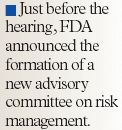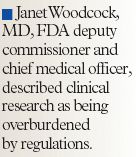- Safety & Recalls
- Regulatory Updates
- Drug Coverage
- COPD
- Cardiovascular
- Obstetrics-Gynecology & Women's Health
- Ophthalmology
- Clinical Pharmacology
- Pediatrics
- Urology
- Pharmacy
- Idiopathic Pulmonary Fibrosis
- Diabetes and Endocrinology
- Allergy, Immunology, and ENT
- Musculoskeletal/Rheumatology
- Respiratory
- Psychiatry and Behavioral Health
- Dermatology
- Oncology
Debate about rosiglitazone safety prompts hearing in House; FDA seeks to update clinical research policies
As Congress continues to work towards the reauthorization of the Prescription Drug User Fee Act (PDUFA), drug safety is once again at center stage after reports of serious cardiovascular problems associated with GlaxoSmithKline's diabetes drug rosiglitazone (Avandia).

Key Points
As Congress continues to work towards the reauthorization of the Prescription Drug User Fee Act (PDUFA), drug safety is once again at center stage after reports of serious cardiovascular problems associated with GlaxoSmithKline's diabetes drug rosiglitazone (Avandia).

Other legislators called for clearer warnings on drug labels and additional curbs on direct-to-consumer (DTC) advertising of products that pose safety concerns. These legislators also want to give FDA more authority to require sponsors to complete agreed-on postmarket studies.
At the hearing, FDA Commissioner Andrew von Eschenbach, MD, said that more resources would help the agency do a better job but did not indicate whether FDA needs stronger authority to regulate marketed drugs and DTC advertising.
In response to questions about why FDA didn't immediately address the cardiovascular safety concerns associated with rosiglitazone, Dr von Eschenbach explained that the agency first wants to do its own analysis of all the rosiglitazone data. FDA has requested that GlaxoSmithKline and Takeda add a boxed warning to the current labeling for rosiglitazone and pioglitazone (Actos), respectively, regarding the potential increased risk of congestive heart failure associated with these agents; pioglitazone is in the same drug class as rosiglitazone.
Just before the hearing, FDA announced the formation of a new advisory committee on risk management to provide a forum for regular discussion of safety issues related to drugs and other medical products.
PLAYING POLITICS
Steven Nissen, MD, department of cardiovascular medicine, Cleveland Clinic, Ohio, and president of the American College of Cardiology (ACC), a long-time critic of FDA and of drugs linked to cardiovascular problems, was at the center of attention at the hearing. It was his meta-analysis in the New England Journal of Medicine (N Engl J Med. 2007;356:2457–2471) that ignited the debate about FDA inaction on safety issues related to diabetes drugs. Rep Darrell Issa (R-California) challenged Dr Nissen's analysis and motives and claimed that Rep Waxman was politicizing what should be a scientific discussion.
But Bruce Psaty, MD, PhD, professor of medicine and epidemiology, University of Washington, Seattle, supported Dr Nissen's study, as did diabetes researcher John Buse, MD, PhD, CDE, associate professor, director of the Diabetes Care Center, and chief of the Division of General Medicine and Clinical Epidemiology, University of North Carolina School of Medicine, Chapel Hill. Dr Buse said that the head of research at SmithKline Beecham, the company that developed rosiglitazone before merging with GlaxoWellcome, attacked him in 1999 for raising concerns about rosiglitazone's safety and intimidated him into retracting some statements. Senate Finance Committee leaders are investigating this allegation.
NO CERTAINTY
Rep Waxman stated that GlaxoSmith-Kline has not produced postmarket studies that "conclusively" demonstrate whether rosiglitazone increases the risk of cardiovascular problems.
The questioning at the hearing delved into such technical issues as the merits of meta-analyses and surrogate end points, details that are unusual for a congressional hearing. FDA officials explained that studies that combine data from many small trials are used primarily to raise questions, not to provide answers. They said FDA seldom relies on meta-analyses when considering the approval of a new drug, in part because clinical trials would take decades to complete if the studies had to measure clinical end points such as survival instead of surrogate end points like blood levels. Moncef Slaoui, PhD, research and development chairman at GlaxoSmithKline, emphasized the benefits of rosiglitazone and the lack of evidence for increased cardiovascular risks in the company's extensive studies. But some legislators said Dr Slaoui's comments could not fully erase skepticism about manufacturers' commitment to investigating safety problems associated with marketed drugs.
A key issue, explained Dr von Eschenbach, is whether patients with type 2 diabetes are better off with or without rosiglitazone, which has demonstrated significant efficacy in controlling blood sugar. The challenge for the regulators, according to Dr von Eschenbach, is to weigh the need to warn patients about a drug's possible adverse events against the possibility of scaring people away from a potentially beneficial treatment.
MODERNIZING CLINICAL RESEARCH


SEEKING QUALITY
FDA's proposed remedy is to establish a Quality System for clinical research. This would involve setting standards for conducting trials and collecting data, using risk-based approaches to define acceptable levels of variation in results, automating data collection and transmission, adopting new methods for evaluating clinical sites and investigators, and updating FDA regulations and guidances. A concept paper prepared for the workshop (available at http:// http://www.fda.gov/oc/initiatives/criticalpath/clinicalresearch.html) outlines various approaches for establishing quality clinical research systems.
As sites and sponsors adopt risk-based and quality approaches, FDA's vision for itself includes a shift from inspecting trials directly to performing audits designed to ensure that a quality research system is functioning as expected. The agency also supports an electronic, rather than paper-based, information system, a move that requires common standards for case report forms, adverse event reports, and electronic medical record systems.
FDA and the research community plan to issue a white paper on the components of global quality clinical research.
FDA is weighing the need for rule-making to revise some of its 30-year-old regulations, such as penalties for parties that falsify data. Sponsors are looking for harmonized quality research standards and risk-based approaches through the International Conference on Harmonization. With medical research costs rising and the media and Congress zeroing in on clinical trial operations, there are many reasons to champion a more risk-based approach that clarifies research requirements and offers more value to patients.
Ms Wechsler is a Washington-based reporter specializing in federal and state healthcare issues.
Employers Face Barriers With Adopting Biosimilars
March 1st 2022Despite the promise of savings billions of dollars in the United States, adoption of biosimilars has been slow. A roundtable discussion among employers highlighted some of the barriers, including formulary design and drug pricing and rebates.
